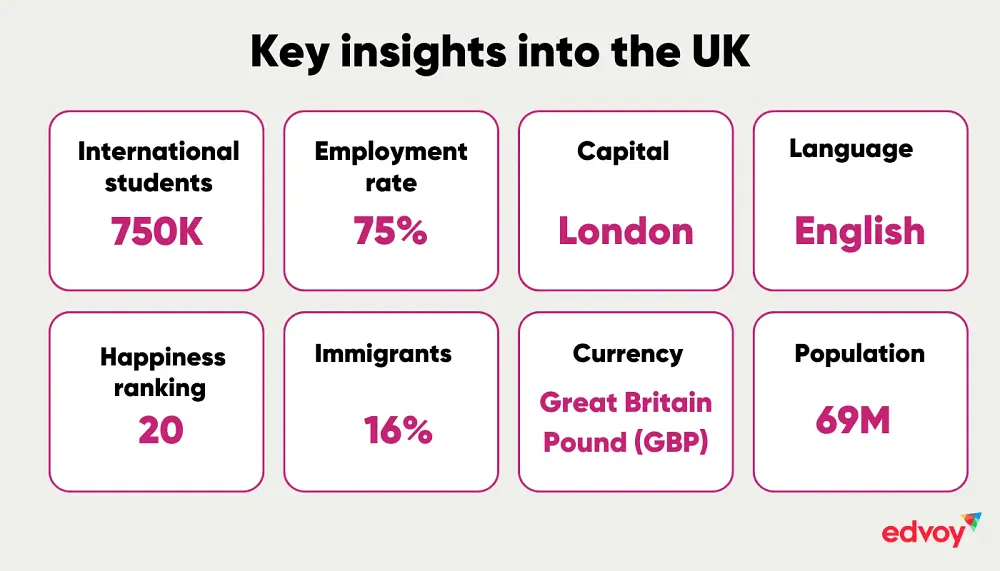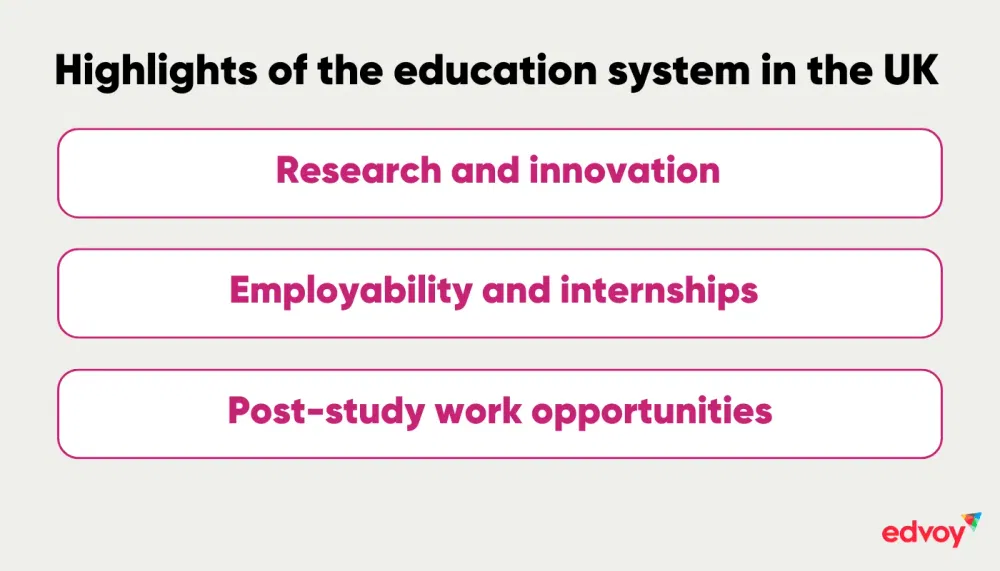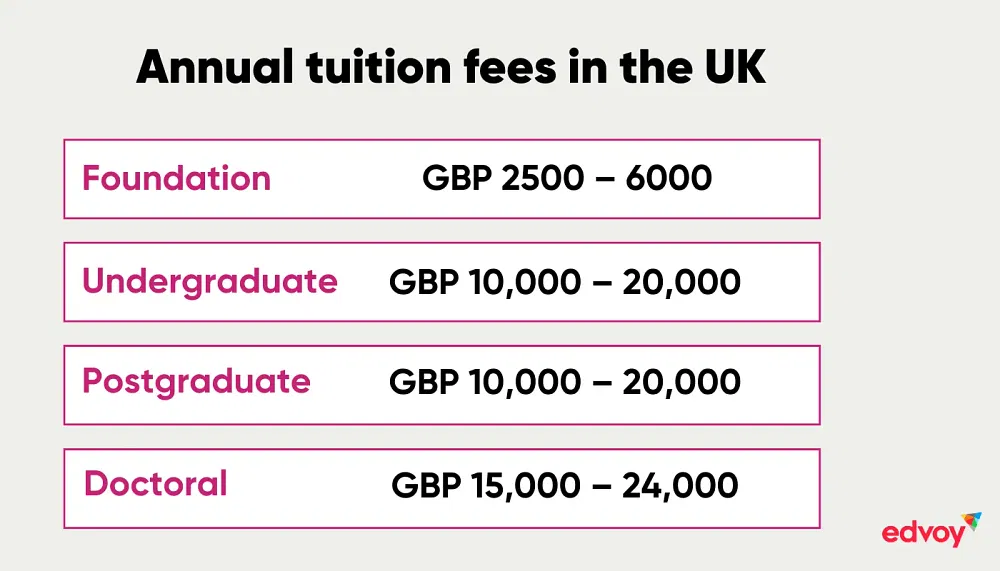Your study abroad dream needs action! Don’t miss the next intake—apply now!

Get a complete guide to studying in the UK.
Moving to the UK for your studies is a big step. If you’re curious about the education system here, you may have a lot of questions about how things work. Don’t worry, our experts have broken it down for you. Just click on the topics that interest you and find all the key information you need.
| Student life in the UK | Student visa in the UK |
| Education system in the UK | Cost of living in the UK |
| Best universities in the UK | Best courses in the UK |
The education system in the UK is renowned for its academic rigour while encouraging independent learning and research. One unique feature of the UK education system is its focus on specialised courses and the freedom to select courses to suit your career aspirations. This approach allows you to gain both in-depth knowledge and hands-on experience. Keep reading to discover more about the UK’s educational system, available programs, costs, and more.
Overview
The UK education system is structured into three main stages: primary, secondary, and higher education. Primary education usually starts at age 4 and lasts until around age 11. Then, secondary education follows, covering ages 11 to 18, where students complete their General Certificate of Secondary Education (GCSE) and may continue to A-levels or vocational qualifications.
Higher education in the UK is recognised across the world and includes universities and colleges offering undergraduate, postgraduate, and vocational courses.
The education system in the UK is regulated by several bodies to ensure quality and consistency. The Department for Education (DfE) is responsible for overseeing primary and secondary education, while higher education institutions are governed by the Office for Students (OfS) and the Quality Assurance Agency (QAA).
Highlights
Studying in the UK is a unique experience, because you get the skills needed for a well-developed career, along with a world-class education. You’ll see this focus reflected mainly in the specialised programs offered in areas such as technology, business, and the arts. Let’s explore the key highlights of the UK’s education system and what makes it attractive.

Research and innovation in the UK
Universities in the UK have many distinct highlights and advantages. These include state-of-the-art research facilities and project opportunities for you, that have real-world applications. The universities also have close partnerships with various industries in several fields, such as engineering, sustainable energy, banking, and many more. The emphasis on practical experience and industry relevance is really strong among universities in the UK, and this prepares you for successful careers.
Employability and internships in the UK
The next striking highlight is that the universities in the UK provide extensive employability programs and work placements to enhance your job readiness after graduation. This will greatly help you gain hands-on experience in your chosen field of study. Not just that, the UK has rapidly growing tech, finance, and renewable energy sectors, and they offer tons of internships. These internships give you hands-on experience and a real feel of the UK job market, which can totally boost your career.
Post-study work opportunities in the UK
The UK offers the Graduate Route – a post-study work visa that allows international students to stay in the country for up to two years after completing a degree (three years for doctoral graduates). Using this, you can stay in the country and look for jobs. With thriving industries such as technology, finance, healthcare, and engineering, the UK provides many job opportunities. Several leading companies, including Google, Microsoft, and HSBC, have a strong presence in the UK, increasing your chances of finding a high-paying job.
The higher education landscape
Your higher education plays a crucial role in shaping your personal and professional growth. That’s where the UK is an ideal choice, as it continues to lead in fields like medicine, law, engineering, and the arts.
The country is a global leader in education and research, with many universities. In fact, According to recent data, the UK has over 130 universities, with many ranked among the top globally. The UK's higher education system is diverse and is generally divided into three main levels: undergraduate, postgraduate, and doctoral education.
If you're keen to learn more about the study levels in the UK, take a look at the tables below.
Study levels in the UK
Typically, universities have multiple intakes each year, with the main intake in September, while some institutions also offer a January intake for certain courses. Check out the table below for more details on the intakes.
| Study levels | Duration | Description |
| Vocational | 1 - 6 years | Vocational training emphasises practical education, with more focus on career aspects, and is offered by Institutes of Technology and colleges. |
| Foundation | 6 months - 1 year | Foundation programs are preparatory courses to meet entry requirements for the university. |
| Undergraduate | 3 - 4 years | Undergraduate courses are entry-level higher education programs for students who have just finished school. |
| Postgraduate | 1 - 2 years | Postgraduate programs are advanced studies for students with an undergraduate degree. |
| Doctoral | 3 - 6 years | Doctoral programs are the highest level of academic study focused on research. |
Also read: Intakes in UK
Undergraduate courses in the UK
The UK offers a range of undergraduate programs, including Bachelor's degrees, Higher National Diplomas (HNDs), Foundation degrees, and more. These qualifications provide valuable, industry-focused learning, giving you the practical and theoretical skills you need to succeed in your career.
Check out the table below for more insights.
| Types of undergraduate courses | Duration | Description |
| Foundation degree | 2 years | These programs offer you practical skills and knowledge for entry into specific universities or courses. |
| Higher National Diploma (HND) | 2 years | HNDs focus on technical and practical skills to prepare you for specific careers in various industries. |
| Bachelor’s degree | 3 - 4 years | This program provides theoretical and practical learning, preparing you for a wide range of professions. |
Postgraduate courses in the UK
The UK offers several types of postgraduate programs, including Master's degrees, Postgraduate Diplomas, Postgraduate Certificates, and Doctorates. These courses are designed to deepen your knowledge, enhance your skills, and prepare you for advanced career roles. These courses also offer an excellent opportunity for your career advancement with specialisations. Many universities offer flexible study options, including full-time, part-time, and online courses.
Here’s a look at the main types of postgraduate courses:
| Types of postgraduate courses | Duration | Description |
| Postgraduate Certificate (PGCert) | 6 months - 1 year | These are short, focused programs that allow you to gain specialised knowledge in a particular field, often for career development. |
| Postgraduate Diploma (PGDip) | 1 year | These courses offer you more learning beyond undergraduate studies, mostly in-depth knowledge and professional expertise in a subject. |
| Master’s degree | 1 - 2 years | Master’s degrees give you a comprehensive study of a specific field, often combining academic learning and practical experience. |
| Doctorate (PhD) | 3 - 6 years | PhDs are research-focused qualifications that allow you to contribute original knowledge to your chosen field through independent research. |
Cost of education in the UK
Studying abroad can be a significant financial investment, especially in countries like the UK, where tuition fees and living expenses can be high. Hence it’s crucial for you to have a clear understanding of the total cost of education. The costs can vary depending on the university, location, and level of study. To give you an idea of what to expect, here’s an outline of the typical tuition fees for various study levels in the UK.

Besides this, you also need to think of accommodation, food, transportation, and other personal expenses. Your accommodation will take up a major portion of your budget, ranging anywhere from GBP 600 to GBP 1200 every year.
Likewise, food costs would be around GBP 150 to GBP 250 per month, depending on your lifestyle. If any, utility bills can be around GBP 100 to GBP 200 monthly. Transport expenses vary, ranging from GBP 50 to GBP 100, but your student travel cards help reduce the cost. Your health insurance is mandatory and would cost you GBP 470 annually. Lastly, you can expect a few other miscellaneous expenses.
To help manage your educational costs, Edvoy Funds can be an excellent resource. Edvoy Funds connects you with 10+ financial institutions that provide pre-approved education loans in 48 hours.
Download our all-in-one Edvoy app and try the “Funds” feature.
Final thoughts
The UK’s education system combines academic excellence and research innovation, with a diverse range of undergraduate and postgraduate programs, making it a top destination for international students. With world-renowned universities, expert faculty, friendly student life and industry connections, the UK stands out for its educational opportunities.
From undergraduate to doctoral programs, you have all the levels of study you want. While the cost of education can be high, understanding tuition fees and living expenses in advance can help you manage finances more effectively. And this can really help you finish your higher education with ease.
Looking to study in the UK? We have numerous partner universities in the UK offering a range of courses for you to choose from.
Our AI-powered app and experienced counsellors simplify the entire study-abroad process, from course search and application to enrollment. Join the 85K+ students from 25+ countries who have realised their study-abroad dreams with us!
Start your study-abroad journey today!
Frequently asked questions
What are the basic requirements for international students to apply to UK universities?
To apply to UK universities, you need a recognised academic qualification equivalent to the UK's A-levels or high school diploma. You also need to meet English language proficiency requirements through tests like IELTS, TOEFL, or an equivalent. Each university may have its own specific requirements, so it's important to check individual course details.
Which subject is the best to study in the UK?
The UK is a leader in many fields of study, with some of the most popular and in-demand courses being Data Science, Artificial Intelligence, Cybersecurity, Computer Science, Business, Finance, and Engineering. These subjects offer you excellent job prospects, and graduates in these fields can easily secure high-paying roles in leading global companies.
Can I work while studying in the UK as an international student?
Yes, you can. As an international student, you can work up to 20 hours per week part-time during the term, and full-time during vacations, as permitted by UK student visa regulations. You can get a minimum wage of GBP 9 to 12 based on your age and location.